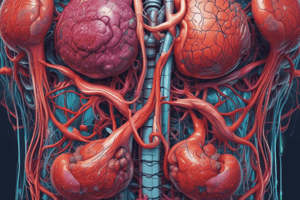Podcast
Questions and Answers
Signals from the environment that indicate changes are called ______.
Signals from the environment that indicate changes are called ______.
stimuli
The part of a neuron that receives signals is called a ______.
The part of a neuron that receives signals is called a ______.
receptor
Electrical signals that are sent out through the nervous system are known as ______.
Electrical signals that are sent out through the nervous system are known as ______.
impulse
A type of action that bypasses the central nervous system for an immediate response is a ______.
A type of action that bypasses the central nervous system for an immediate response is a ______.
The part of a neuron responsible for sending signals is the ______.
The part of a neuron responsible for sending signals is the ______.
In fight-or-flight situations, the hormone released is called ______.
In fight-or-flight situations, the hormone released is called ______.
The gland that releases insulin is the ______.
The gland that releases insulin is the ______.
The male hormone for secondary sexual characteristics is called ______.
The male hormone for secondary sexual characteristics is called ______.
______ are female hormones responsible for secondary sexual characteristics.
______ are female hormones responsible for secondary sexual characteristics.
Homeostasis refers to the body's internal ______.
Homeostasis refers to the body's internal ______.
Flashcards are hidden until you start studying
Study Notes
Nervous System & Endocrine System
- The nervous system uses electrical signals (impulses) to transmit messages through the body, while the endocrine system uses chemical signals (hormones)
- The nervous system is faster than the endocrine system
- The effects of the nervous system are short-lived, while the effects of the endocrine system are long-lasting.
- The nervous system controls rapid responses to stimuli, while the endocrine system controls long-term processes like growth and development.
- Neurons are the basic unit of the nervous system; glands are the basic unit of the endocrine system
Key Terms
- Stimuli: Signals, changes, or events in the environment that trigger a reaction in an organism
- Impulse: An electrical signal transmitted along a neuron
- Receptor: A specialized cell or structure that detects stimuli
- Effectors: Muscles or glands that carry out a response to a stimulus.
- Reflex: An automatic, rapid response to a stimulus mediated by the spinal cord, bypassing the brain
- Adrenaline: Hormone secreted by the adrenal glands that causes fight-or-flight response.
- Oestrogen: Female sex hormone responsible for secondary sexual characteristics
- Testosterone: Male sex hormone responsible for secondary sexual characteristics
- Pancreas: A gland that releases insulin to regulate blood sugar levels.
True/False
- False: Effectors are muscle or gland cells that carry out the response to a stimulus.
- True: The Central Nervous System (CNS) consists of the brain and spinal cord.
- True: Relay neurons connect and transmit signals between different neurons.
- False: Motor neurons are connected to effectors, not receptors.
- True: Homeostasis is the body's ability to maintain a stable internal environment.
- True: Shivering is triggered when the body needs to generate heat in cold temperatures.
- True: Blood vessels dilate to release heat when the body is too warm.
- True: Glucagon raises blood sugar levels.
- False: Negative feedback always decreases a value in the body.
- True: A synapse is the gap between two neurons where signals are transmitted using neurotransmitters.
Short Response Questions
- Relevance and Coherence scores should be based on how well the student demonstrates understanding and provides relevant information in their answers, and with few errors.
Studying That Suits You
Use AI to generate personalized quizzes and flashcards to suit your learning preferences.



